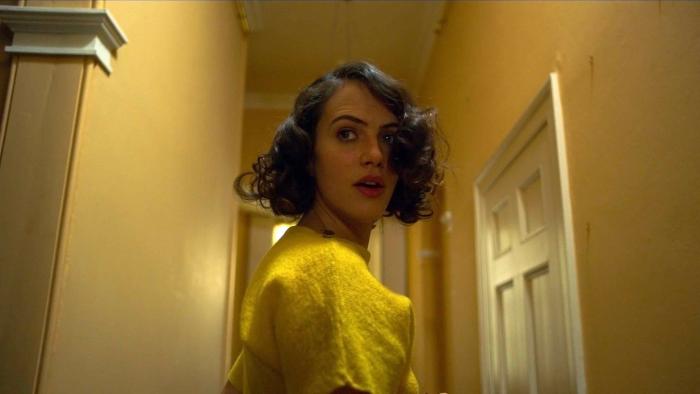By Kristy Puchko | Film | April 15, 2021

Christopher Smith has brought audiences such inventive thrills as the slasher/workplace comedy Severance, the historical horror of Black Death, and the time-loop terror of Triangle. Now, he’s digging into folk horror for the chilling haunted house tale The Banishing.
Against the backdrop of pre-World War II England, Downton Abbey’s Jessica Brown Findlay stars as outspoken wife and mother Marianne, whose reverend/husband Linus (John Heffernan) has been reassigned to a murky village’s failing church. The house awarded to their family is grand but grim, full of dark corners, secret passages, and horrid secrets. Purportedly based on the true story of “the most haunted house in England,” The Banishing grounds its story firmly in folk horror, weaving in ritualistic torture, a community covering a wretched wrong, and a ghost hellbent on unearthing it.
Smith leans into the folk horror vibe with a slow burn suspense. A grisly opening warns viewers of the evil that resides in this house, so every idle moment of Marianne alone sings with tension. Handheld cinematography accentuates this anxiety, trembling every so slightly so that we might never feel safe or settled. The light of lanterns creates the rich colors of an oil painting, but with a veneer of shadow that seems a sheen of dust. This ties the living immediately into the history of the house, as if they are trapped like the frozen figures in the paintings clinging to its halls.
The screenplay by David Beton, Ray Bogdanovich, and Dean Lines steadily slips into the surreal, blurring the lines of time and place, so that we follow Marianne like Alice down the rabbit hole. A keyhole might transport us not the hall outside her bedroom, but to a tiled corridor, cold and foreboding, where a frazzled version of this young mum rushes by at a panicked pace. Mirrors will not be tools for slasher-style jump scares, but portals to transcend space in spooky ways. The Banishing binds us tightly to Marianne, as she chases her young daughter (Anya McKenna-Bruce) through a cruel labyrinth of rooms, faces off against her snarling husband, and slips into rooms where she already stands, agape and lost.
Smith, who offered plenty of delicious doppelgänger danger in Triangle, makes these slippery surreal scares utterly bone-chilling. Marianne turns a corner, and the world that she knew—that she understood—is ripped away with the reveal of herself seeing herselves. One such scene unnerved me so intensely that I paused the movie to go turn on every light in my home. It’s not as if there’s a plot point that evil can only lurk in shadows. I just really NEEDED all the lights on before I continued. It’s fine. Thanks for asking.
Smith digs into the house’s mysteries with a teeth-grit earnestness, unearthing fresh scares along with an unsettling mythos. Like so many horror heroines before her, Marianne has a curious connection to the perturbing poltergeist, and this tie is regarded as both a power and a curse by others. Smith smartly aligns this with his heroine’s feminist attitude. Marianne demands to be heard and to be seen as more than the pastor’s wife or her worst mistake. This makes her an object of marvel and scorn, depending on her visitor. By extension, being damned or “evil” is all in the eye of the beholder (A.K.A. any man in power).
Less neatly tied in is the Nazi threat that looms over the film as a whole. In passing, it’s mentioned that an icy bishop (John Lynch) has Nazi ties. A local heretic (Sean Harris) appears haunted by the horrors he knows are to come, while reverend Linus frets over what to tell his parish about the could-be war. Perhaps Marianne’s struggle is meant to reflect those who will suffer because of Hitler’s deranged dogma. However, I fear that’s me giving the screenplay more credit than it deserves. The WWII setting feels more dread-filled backdrop than effectively woven into this battle at home. Thus, the film’s final twist seems plucked out of thin air instead of grounded, marring what might have been a supremely haunting end.
Ultimately, The Banishing is eerie and entertaining, walking in the steps of films like The Queen of Black Magic or The Ring, but with its own patient gait. Smith is not re-inventing the subgenre here, and the historical element could certainly use greater context. (Perhaps the film plays better to English audiences, whose understanding of WWII might be more deeply tied to the occult?) Nonetheless, Smith has made a satisfyingly chilling film, with a luscious look, a solidly spooky story, and a crackerjack cast that crackles with on-the-edge energy.
The Banishing premieres on Shudder on April 15.